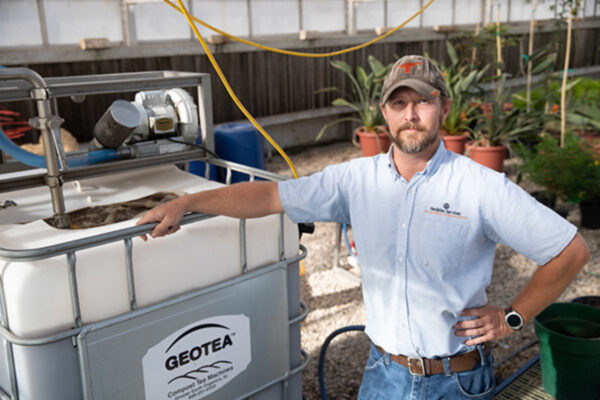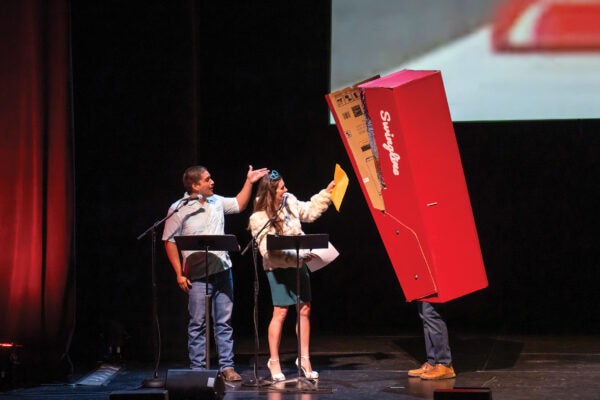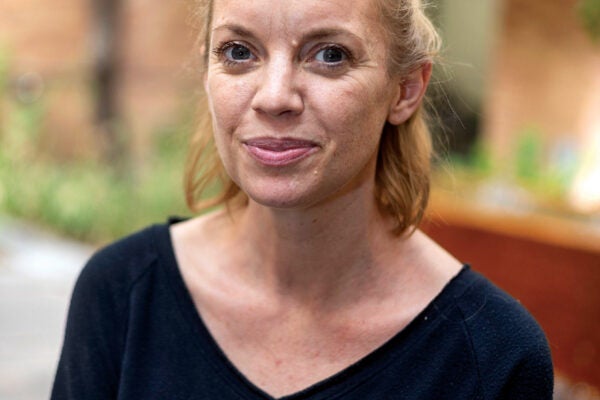East of Interstate 35 between Manor Road and Dean Keeton Street is a collection of monochromatic workshops and warehouses behind concrete walls and iron gates. Approximately every 30 minutes, a caravan of golf carts and utility vehicles cycles in or out. This is the Facilities Complex at The University of Texas at Austin.
Against the barrier between building FC8 and Dean Keeton is a 10-foot-high pile of broken-down leaves, bark and plant matter that spans the length of the facility. Next to the pile are greenhouses and office space for UT’s landscaping crew, led by Justin Hayes.
Hayes steps outside to retrieve a green 2-gallon bucket filled with finished compost.
“The compost itself is where you get your source of life. A handful of compost has more living organisms in it than there are people on the planet,” Hayes says.
Skid-steer loaders and utility trucks zip about, dumping fresh leaves and branches at one end of the compost pile and rotating older sections that are further along in the decomposition process.
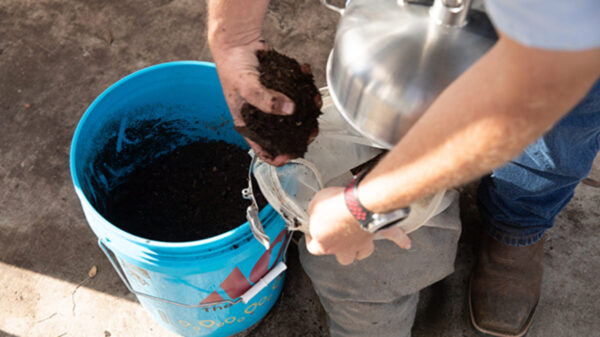
Inside a greenhouse, Hayes flips a switch to begin aerating a 275-gallon tank filled with rainwater.
“We use rainwater instead of city water because city water has antimicrobial agents like chlorine and fluoride, which would kill the microbes in your compost,” Hayes says.
Next, molasses is gooped and globbed into the tank. It swirls around, filling the air with a sweet, malty smell.
A 2-gallon tea bag locks in the billions of beneficial critters from the compost bucket that await the feast of their lifetimes. Hayes plunges the bag into the tank, and the water instantly comes alive, foaming and frothing as the microbes awaken and consume the circulating sugar and oxygen so they can replicate and grow.
The brewing of Hayes’ compost tea has begun.
Twenty-four hours later, foam overflows onto the greenhouse floor, and the tea is at its prime — and will be for the next 36 hours — for fertilizing and strengthening plants all across UT’s campus.
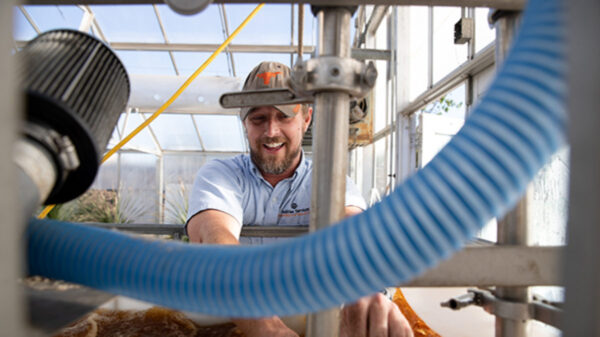
Hayes, who began his career 22 years ago, says his focus as a landscaper has shifted from what he calls a “playbook” of universal fertilization and watering instructions to looking at how best to replace what plants take out of the soil.
“If I was to put a crappy foundation under a building, it would fall down. It’s the same thing with soil. If you build up your soil, you build the strength of your plant,” Hayes says. “Compost is the effort to regenerate and replace the soil.”
In 2008, Hayes began working at UT as a groundskeeper.
“I worked my way up to a crew leader for zone 3, the main campus district. We won best grass in Texas for all the grass that’s in front of the AT&T Center in 2012,” Hayes says. “That was the first thing on campus, landscapingwise, that we did organically.”
Hayes also converted the South Mall lawn to stronger organic grass. The lawn previously had to be replaced every year in time for graduation, he said, costing the university $50,000 annually. It’s now been seven years since it needed to be replaced.
With his team of six and Markus Hogue, program coordinator of irrigation and water conservation, Hayes helped achieve SITES gold certification — a sustainability initiative for landscape architects — for the Dell Medical District in November 2017 by implementing a compost program, using organic and native plants, avoiding synthetic pesticides and fertilizers, and conserving water.
The tea-making began when Hayes was put in charge of shifting compost production from a third-party source to UT’s Facilities Complex. He is now an advocate for the sweet amber liquid — for plant consumption only. In addition to using the tea as fertilizer for landscaping around campus, Hayes brings water bottles filled with the mixture to sustainability fairs to hand out to staff members, faculty members and students. Some fans now request to pick up bottles to feed their office plants or home gardens.
The product is not for sale. Instead, Hayes’ mission is to show people that they can use free waste resources to feed and improve the vitality of their plants.
Hayes’ vision is to convert the entire Forty Acres into a robust, self-sustained environment that exemplifies organic practices and resource conservation.
“It’s not that it’s no-maintenance because there is no such thing as a no-maintenance landscape,” Hayes says. “But you want to be able to eventually step back and (say), this area is good for two years. We don’t have to come back here.”

